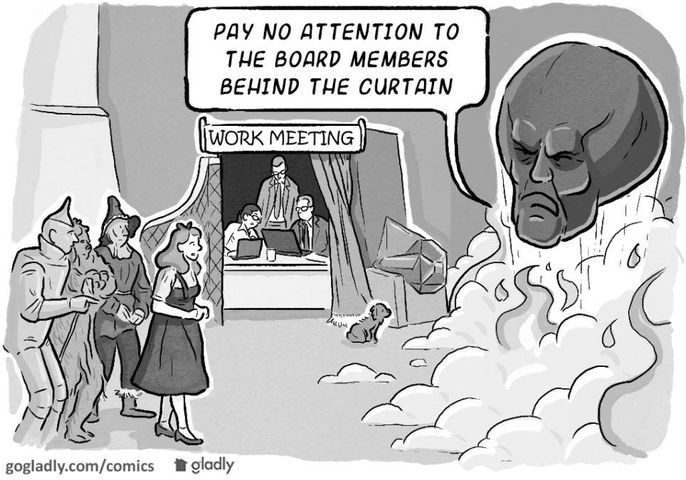Board Transparency – Issues and Considerations for Florida Condominiums and HOA’s
By HMI

Are you holding “illegal” Board Meetings? You might be without even being aware! Do you know that discussing Association matters among a group of Board Members could be in violation of Florida Statutes if a majority (or quorum) of Board Members are present? It is important that board members follow Florida law, as well as their Association’s bylaws, when it comes to holding meetings and approving purchases. Business to be discussed at board meetings cannot be discussed privately by Board Members, if there are enough members present to create a quorum of the Board. All such business must be covered at a properly noticed public meeting of the Board that is open to all owners.
Florida statutes require that Condominium Associations and HOA’s post notices for all meetings of the Board of Directors in a public place at least 48-hours prior to those meetings (or in accordance with the Association’s governing documents…some Associations require greater notice). In addition, for Condominium Associations, the meeting agenda must also be posted.
It is also the case that all purchases which are not part of ongoing expenses itemized in an approved budget must be voted on and approved (or ratified – i.e. approved after the fact) by the Board of Directors at a properly noticed Board Meeting. There are several exceptions to this rule, the most common being purchases made for emergency items, and purchases made under a pre-approved spending limit (i.e. – a Board may vote to allow the President to make purchases up to a set amount for routine expenses). Again, these purchases would then need to be ratified at the next properly noticed meeting of the Board.
Below are excerpts from articles from attorneys on this subject. For the complete articles, please click on the corresponding web link.
From Ejola Cook, Attorney at Law, The Ticktin Law Group, Tallahassee, FL
At this point, you might be wondering, well how do we keep the information about our Board’s business public, so secret meetings cannot take place. Home Owner Associations do have to abide by Florida Statute §720.303.
(2) BOARD MEETINGS.—
(a) A meeting of the board of directors of an association occurs whenever a quorum of the board gathers to conduct association business. All meetings of the board must be open to all members except for meetings between the board and its attorney with respect to proposed or pending litigation where the contents of the discussion would otherwise be governed by the attorney-client privilege. The provisions of this subsection shall also apply to the meetings of any committee or other similar body when a final decision will be made regarding the expenditure of association funds and to meetings of anybody vested with the power to approve or disapprove architectural decisions with respect to a specific parcel of residential property owned by a member of the community.
(b) Members have the right to attend all meetings of the board. The right to attend such meetings includes the right to speak at such meetings with reference to all designated items. The association may adopt written reasonable rules expanding the right of members to speak and governing the frequency, duration, and other manner of member statements, which rules must be consistent with this paragraph and may include a sign-up sheet for members wishing to speak. Notwithstanding any other law, meetings between the board or a committee and the association’s attorney to discuss proposed or pending litigation or meetings of the board held for the purpose of discussing personnel matters are not required to be open to the members other than directors...
Reference link: http://legalbrains.com/are- home-owner-associations-bound- by-the-sunshine-law/
From The Cooperator, The Condo and HOA Resource
“Under Florida law, community associations have to be open to their owners with regards to the operations of the community,” says Michael Hyman, an attorney and shareholder with Siegfried Rivera Hyman Lerner De La Torre Mars & Sobel LLP in Miami.
In the absence of transparency, mistrust tends to flourish, say the pros. “When the association representatives are not effective in their communication, dissent among the owners tends to increase,” says Robert L. Kaye, managing member of the law firm of Kaye Bender Rembaum in Pompano Beach. “When only those with negative messages about the association, the board, and/or management are communicating to the owners, and there is nothing from the association, owners may also tend to believe what they receive.”
Reference link: http://flcooperator.com/ article/loud-clear/full#cut
From Becker and Poliakoff, Legal and Business Strategies
One of the most frequently debated topics is what constitutes the "conduct" of business. We have seen many associations whose directors meet under the auspices of "executive sessions", "planning meetings", or "agenda development workshops", argue that a quorum of the board could gather out of the sunshine as long as no binding votes were being taken.
However, this is not what the law says, and is certainly not what it means. Although we are not aware of any reported appellate court cases in the association context, there are a number of cases in the public arena that have held that any interaction contributing to the development of ideas constitutes a "meeting", without regard to whether or not a formal vote has been taken.
Otherwise, association boards could make decisions in "executive session", with the "public meeting" being simply a rubber-stamp event. While many associations legitimately desire to avoid certain topics in open meetings, it is simply the price that is paid for the owners' right to remain informed. To do otherwise defeats the statutory requirements that board meetings be open and that the owners have the right to participate.
Reference link: http://www.becker-poliakoff. com/Files/7165_sunshine_law_ 2013.pdf
In addition to the obvious liability involved with violating Florida Statutes, there are other undesirable consequences associated with “private” meetings between Board Members. Suspicion can be aroused among owners when they are not included in discussions about Association business. Private discussions about Association matters not only excludes owners, but they exclude other Board Members…giving the impression of a Board within the Board. To the contrary, owners can sometimes be a source of valuable information about a variety of situations that develop in a community. On some occasions, they may even offer expertise in a specific area due to their work experience. A Board can sometimes lose out on valuable information, or volunteer assistance by not openly discussing business in a public forum.
From the standpoint of purchases that are not approved by the board, owner suspicion is also aroused when their money is spent without their knowledge. If board members are excluded from these decisions, the suspicion can be even more pronounced. All non-emergency purchase decisions should be brought before the board if they are not explicitly included in an approved budget.
To simplify purchases for minor repairs and replacements to the common fixtures, systems, or furnishings, the Board should agree on criteria for such approvals ahead of time with a written policy, voted on by the Board and documented in the meeting minutes. However, for more substantial improvements or upgrades, all proposals should be brought to board meetings for approval. The Board may choose to set a dollar limit to define “substantial” expenses.
So, as a reminder about issues concerning transparency, Boards should ensure that the following policies are closely followed:
- Board Meetings should always be posted in advance in accordance with Florida statutory requirements and the Association’s docs.
- Any time a quorum of the Board is present, Association business can only be discussed if it is in the context of a properly noticed Board Meeting.
- The only times Florida Statutes permit a private, or “Closed” Board Meeting are 1) to meet with the Association’s legal counsel on current or pending legal matters; or 2) to discuss personnel matters. No other Association business may be discussed at these types of meetings, and they still must be properly noticed in accordance with Florida statutory requirements.
- Only expenditures that qualify as minor "repair and replace" items, ongoing expenses that are included in the annual approved budget, or emergency expenses, may be processed without Board approval at a public board meeting. These expenditures should be itemized, reported at the next Board meeting, and retained as official records that are accessible to owners, upon request.
- Upgrades to any part of the building, systems, furnishings, and services, which do not qualify as replacements for defective items, should be approved at a public Board meeting.
- All expenditures which qualify as improvements to the Association’s common elements, systems, furnishings, and services should be approved at Board meetings held with owners. Some of these expenditures may first require approval by as much as 75% of owners, depending on the Association’s Bylaws and/or Florida Statutes, especially when dealing with “material alterations” of the common elements of the property.
The bottom line is… there are liability concerns to consider if you do not follow Florida Statutes or your respective documents. There is also a risk that owners will not trust Board decisions that are not discussed and approved in a public meeting. Boards that follow the above recommendations will minimize these risks, and their owners will likely respect their efforts to maintain transparency and open communications.
With more than 45 years experience in the Central Florida area, Hara Community 1st Advisors has the expertise needed to efficiently manage your Condominium or Homeowner’s Association while providing the highest level of service to Boards and Owners. Contact HMI’s Regional Director Rick Michaud, or visit HMI online to learn more about their variety of client-customized services today.
About the Business
Have a question? Ask the experts!
Send your question

